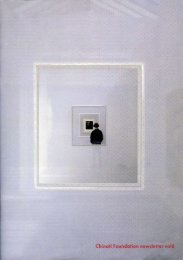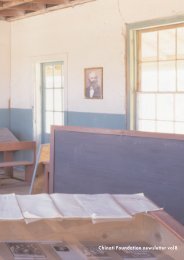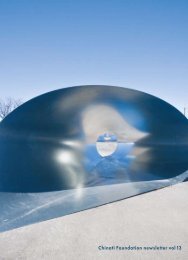Untitled - The Chinati Foundation
Untitled - The Chinati Foundation
Untitled - The Chinati Foundation
Create successful ePaper yourself
Turn your PDF publications into a flip-book with our unique Google optimized e-Paper software.
ALBERS TEACHING THE COLOR COURSE, BLACK MOUNTAIN COLLEGE, SUMMER 1948. PHOTOGRAPH BY CLEMENS KALISCHER.<br />
being away from the increasingly<br />
fractious climate that had started to<br />
bedevil Black Mountain. One source<br />
of the difficulties of 1946 was the exasperation<br />
Albers felt for John Wallen,<br />
whose idealism expressed itself<br />
in a desire to impose greater order<br />
on the college. Martin Duberman,<br />
who chronicled the events in detail,<br />
astutely determined that the root of<br />
the friction between Albers and the<br />
idealistic, twenty-eight-year-old, Harvard-educated<br />
Wallen lay in the fact<br />
that “Albers was…concerned…that<br />
Wallen’s interest in efficiency and<br />
neatly defined structures might…stifle<br />
variety and spontaneity.” 44 Ted<br />
and Bobbie Dreier had also written<br />
about the college’s problems at this<br />
time, and to these close friends Albers<br />
sent a heartfelt and revealing response.<br />
45 “Since last year,” he wrote,<br />
“I have grown more and more doubtful<br />
whether I can do there still what I<br />
need to do for myself and what I wish<br />
to do for the college.” Albers’s misgivings<br />
about the college centered<br />
on faculty members who “placed<br />
governing before serving…[and for<br />
whom]…appearing important has<br />
become as important as being important.”<br />
He specifically mentioned<br />
Wallen, wondering “how anyone<br />
could take him seriously as a college<br />
la universidad. Una de las fuentes de<br />
los problemas de 1946 fue la exaspe-<br />
ración que sentía Albers hacia John Wa-<br />
ller, cuyo idealismo se manifestó en un<br />
deseo de imponer un mayor orden en la<br />
universidad. Martin Duberman, quien<br />
escribió en detalle sobre estos aconte-<br />
cimientos, comprendió sagazmente que<br />
la raíz de la disputa entre Albers y el<br />
idealista Wallen, de 28 años y educado<br />
en Harvard, residía en el hecho de que<br />
“A Albers le preocupaba… que el interés<br />
de Wallen en la eficiencia y las estructu-<br />
ras bien definidas pudiera perjudicar la<br />
variedad y la espontaneidad.” 44 Ted y<br />
Bobbie Dreier también habían escrito<br />
sobre los problemas de Black Mountain<br />
en ese tiempo, y a estos íntimos amigos<br />
Albers les mandó una respuesta franca<br />
y reveladora. 45 “Desde el año pasado”,<br />
escribió, “me han entrado dudas y no sé<br />
si todavía pueda hacer allí lo que tengo<br />
que hacer por mí mismo y lo que quisie-<br />
ra hacer por la universidad.” Las pre-<br />
ocupaciones de Albers se relacionaban<br />
con los profesores que “concedían ma-<br />
yor importancia a la gobernación que<br />
al servicio… [y para quienes] parecer<br />
importante se ha hecho tan importante<br />
como ser importante.” Albers mencionó<br />
a Wallen específicamente, preguntán-<br />
dose “cómo se le puede tomar en serio<br />
como profesor universitario… Si un ce-<br />
rebro tan revuelto [como el de Wallen]<br />
52<br />
teacher…if such a scrambled brain<br />
[as Wallen’s] can attract a group of<br />
students that long and that much then<br />
there must be something basically<br />
foul with the community providing the<br />
followers,” Albers reflected ruefully.<br />
“Nothing seems more natural…<br />
[than]…build[ing] up strong departments<br />
more strongly,” wrote Albers,<br />
at the same time reminding Dreier<br />
of “my belief that good teaching depends<br />
on personality and experience<br />
more than on method and equipment.”<br />
Putting his finger on one of<br />
the paradoxes of democracy, and<br />
reacting to Wallen’s proposals, Albers<br />
lamented that “nothing is more<br />
discouraging than leveling down toward<br />
the inefficient or weak. I hate<br />
equalization for equalizations [sic]<br />
sake.” Freedom and democracy, Albers<br />
knew, were not absolutes. At<br />
Black Mountain they depended on<br />
“the spiritual climate,” and the current<br />
spiritual climate at Black Mountain<br />
College “worries and disturbs me….<br />
You may give me there all the freedom<br />
for my work one could dream<br />
of,” he wrote, “I would not feel free to<br />
work as long as I see that a need for<br />
opposition is the dominating feature<br />
of the community.” And so, reprising<br />
his faith in practice before theory, Albers<br />
called for “more common sense<br />
ha logrado atraer, durante tanto tiempo<br />
y con tanto éxito, a un grupo de estu-<br />
diantes, entonces debe haber alguna<br />
falla básica con la comunidad de donde<br />
provienen estos seguidores”, advirtió<br />
Albers con tristeza.<br />
“Nada parece más natural… [que] for-<br />
talecer los departamentos que ya son<br />
fuertes”, afirmó Albers, y al mismo<br />
tiempo le recuerda a Dreier “mi creen-<br />
cia de que la buena enseñanza depende<br />
de la personalidad y la experiencia más<br />
que en el método y el equipo”. Señalan-<br />
do una de las paradojas de la democra-<br />
cia, y respondiendo a las propuestas de<br />
Wallen, Albers se lamenta de que “nada<br />
es más desalentador que bajar el nivel<br />
de desempeño para acomodar a débiles<br />
e ineficientes. Odio la igualación con el<br />
simple fin de igualar.” Albers sabía que<br />
la libertad y la democracia no eran ab-<br />
solutas. En Black Mountain dependían<br />
del “clima espiritual”, y el clima espi-<br />
ritual imperante en la universidad “me<br />
preocupa e inquieta… Me podrán dar<br />
toda la libertad imaginable para reali-<br />
zar mi trabajo”, expresó, “pero no me<br />
sentiría libre para trabajar mientras<br />
vea que el rasgo predominante de la<br />
comunidad es la necesidad de la opo-<br />
sición”. Y así, reafirmando su fe en la<br />
práctica antes que la teoría, Albers hizo<br />
un llamado por “más sentido común en<br />
lugar de análisis de segunda categoría






